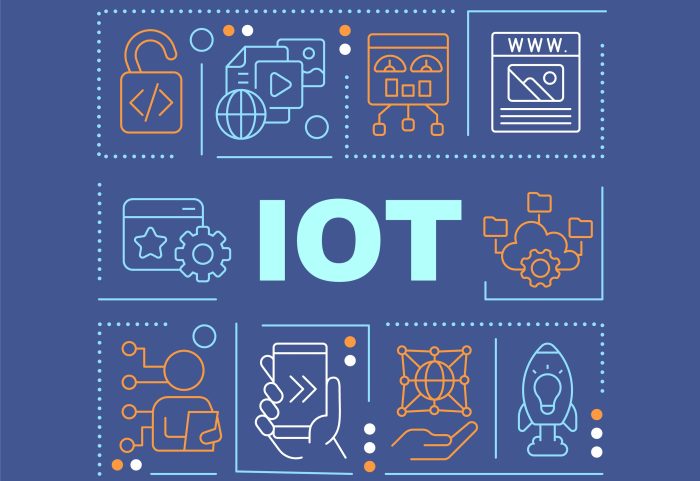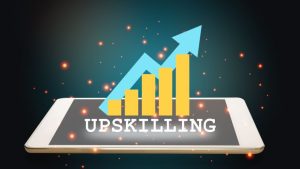7 IoT Skills and How to Develop Them
 Publié le 12 April 2023
Publié le 12 April 2023
Present in all spheres and industries, digital technology quickly transforms how we live and work, bringing new opportunities and challenges. Driven by the IoT (Internet of Things), Industry 4.0 keeps gaining pace and embedding automation and technology into businesses and everyday living. This is what professionals should learn more about 7 IoT skills and how to develop them.
As of the Statista survey, the IoT system counted nearly 14 billion devices in 2021, and that number is expected to reach nearly 31 billion by 2025. With such rapid industry growth, the opportunities for specialists with IoT expertise have a likelihood of emerging quickly..
The demand for developers, engineers, digital designers, and other technology professionals is high and keeps increasing, despite some economic challenges facing the industry. If you are thinking about a career in the tech sector, consider developing the most required IoT skills that will make your resume stand out.
IoT (Internet of Things) Importance
A keystone of Tech Industry 4.0 (which conceptualizes the current era of connectivity, automation, and advanced manufacturing technology), IoT refers to electronic devices equipped with sensors and smart technology and connected to a common network to communicate and share data with each other using the Internet. Those devices (“things”) include not only smartphones, PCs, and tablets but also ordinary household units and advanced industrial machinery. Your new WIFI-equipped refrigerator? That is part of the IoT as well.
Using cloud computing, data analysis, wireless technologies, and Big Data, IoT enables seamless physical object interaction and info exchange without human support. This type of hyperconnection smoothly bridges the physical and digital worlds, with the intention of creating a more streamlined user experience.
Additionally, staying updated on the latest advancements in online cloud training courses is essential for professionals navigating the dynamic landscape of IoT.
Enhancing the efficiency of Internet-connected systems, IoT technologies greatly facilitate processes and improve overall performance in all crucial economic sectors including the following:
- Power industry;
- Economy and finances;
- Environment protection;
- Transportation and logistics;
- Healthcare;
- Manufacturing and production;
- Commerce, etc.
Obviously enough, the scope of IoT implementation and the importance of this technology determine the need for qualified professionals in all spheres. However, it should be noted that it’s a demand for experts who already have a certain set of skills. Below, we’ll review the most wanted technical skills required to succeed in IoT and how you can develop them to boost your professional profile.
7 IoT Skills and How to Develop Them
1. Programming Languages
To jump into promising IoT positions, you need to have a high command of programming and excel in the following languages that dominate different spheres:
- Python for machine learning, web development, and data analytics;
- JavaScript for elaborating applications and entire backend systems;
- C++ for creating smartly structured programs and is often used in game development.
The key points you should cover are:
- A clear understanding of programming languages structure;
- Data structures and algorithms;
- The basics of code performance optimization;
- The latest trends in programming and coding to catch up with fast-changing system requirements.
Development of such complex solutions requires involvement of an experienced development team. This is a much more complicated process than creating standard web resources (the development process of those can also be facilitated by website templates, plugins, etc. available on TemplateMonster or similar websites).
2. Node.js Development
Node.js is an open-source web programming platform widely favored by developers for creating scalable IoT apps while maintaining Internet safety rules. What makes it perfect for such systems is the ability to maintain secure and stable multiple connections. Featuring incorporated modules and packages, Node.js is actively utilized for server-side web development.
As a result, IoT specialists use Node.js to access firmware development tools and connect the system devices with each other. Professionals with this skill will be able to tackle several tasks at once and achieve great efficiency and connectivity for multi-device systems.
3. Mobile App Development
IoT widely relies on mobile technology. Serving as a mediator between an IoT device and a mobile gadget, a mobile app helps remotely communicate with, controls, and manages these devices.
Hence, it’s crucial for a candidate to be capable of creating and designing mobile apps that are:
- Easy to use and comprehensible for users;
- Compatible with multiple platforms and cloud servers;
- Smoothly working with real-time data.
With mobile app development as part of your IoT skillset, you’ll have better chances of finding a better career path in IoT.
4. API Automation and Testing
Enabled by multiple applications, IoT systems use APIs for quick and efficient data exchange between inter-connected devices. Before being used in the system and entering the market, those applications should be tested to identify and address all potential, bugs and ineffective processes.
Meanwhile, given the complex nature of IoT networks, testing processes themselves should be automated. Hence, a competitive specialist should be well-versed in API automation and QA testing as part of learning 7 IoT skills and how to develop them.
5. Cloud Computing
Surely enough, a wealth of devices communicating in an IoT system produce loads of data that need to be handled and distributed correctly and efficiently. IoT specialists use a distributed computing model for that purpose.
By distributing data using a time sensitivity factor, the framework prevents data transfer stalls and allows managing servers and databases more effectively, without the use of additional hardware. Therefore, make sure you embrace cloud computing as one of the 7 IoT skills as it help companies establish their IoT infrastructure in a functional and cost-effective manner.
6. Artificial Intelligence (AI) and Machine Learning (ML)
AI and ML techniques are used in IoT for data analytics and data organization. While AI is used for collecting and processing huge amounts of data to make independent decisions and predict results, machine learning algorithms contribute to creating smarter appliances. These are already being used in the hiring and recruitment industry to analyze candidate data and track applications for various job roles.
The core elements of big data analytics, machine learning, and artificial intelligence are essential skills to have for a professional, especially now, when Gartner expects that in 2023 over 33% of companies using IoT will also implement AI for their projects.
7. Data Security and Privacy
For a system gathering, processing, and transmitting loads of sensitive data, it’s vital to have adequate digital security measures in place to keep cyber threats at bay. Notably, an IoT network with multiple elements, components, and implementations in it has a number of vulnerabilities, with password security being by far the biggest weak point.
Hence, building a secure and protected infrastructure for such a system is quite a challenge. That’s why professionals with solid cybersecurity and data privacy skills are highly appreciated. Given potential damage to brand image — not to mention the legal ramifications — if companies fail to properly secure the private data of their customers, they will only be looking for knowledge professionals with the right credentials with this IoT skill to secure their networks.
Tips on Developing IoT Skills
- Register for online courses: You can access specialized IoT courses on such platforms as Coursera, edX, and Udacity to polish your knowledge in programming, cybersecurity, data analytics, and more. Certifications you’ll receive upon completion are valued and qualified by employers;
- Consider hackathons and coding challenges: It’s a great opportunity to test your professionalism in real projects as well as to share knowledge, build your professional network, and learn from more experienced specialists;
- Join communities: Need contacts with other professionals in the field? You’ll get them by attending IoT community meetings. By collaborating with other specialists, you’ll stay on top of the latest industry developments, trends, requirements, and technologies;
- Engage in real IoT projects: Potential employers favor candidates that can verify their skills and have some valuable expertise. By working on low-scale or beginner-friendly IoT projects, you’ll get the required experience and will be able to improve your professional skills;
- Be aware of the latest trends: IoT is a quickly growing and constantly transforming industry that welcomes innovations and improvements. Hence, it’s essential to stay informed about the latest trends. Read professional blogs, visit conferences, and follow industry leaders to be the first to know about the updates in the field.
Bottom Line
IoT is a complex industry that rapidly expands and continuously attracts more and more technology professionals. To get prepared for your IoT career and achieve quick results, develop skills in programming languages, data analytics, cybersecurity, cloud computing, and AI. Once you know these 7 IoT skills and how to develop them, you will be able to consistently upgrade your abilities to build a long career in this industry.







